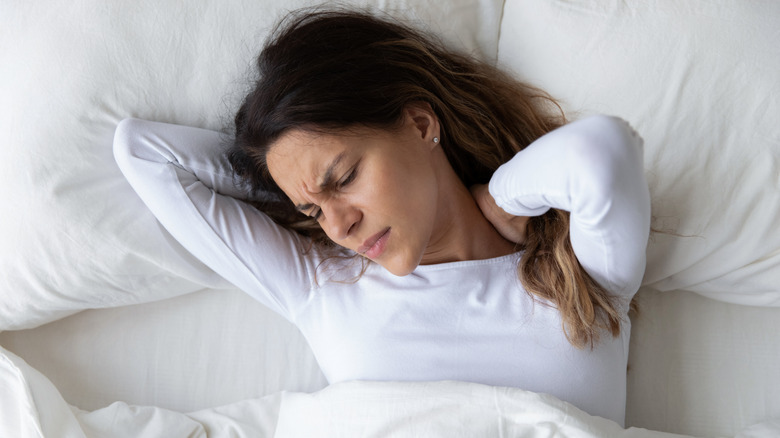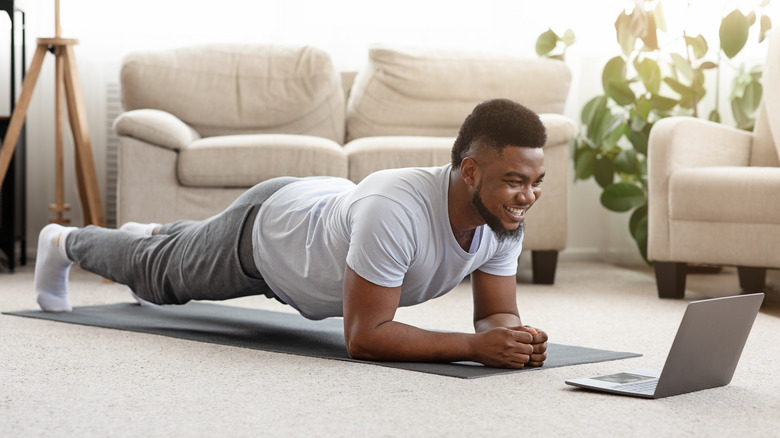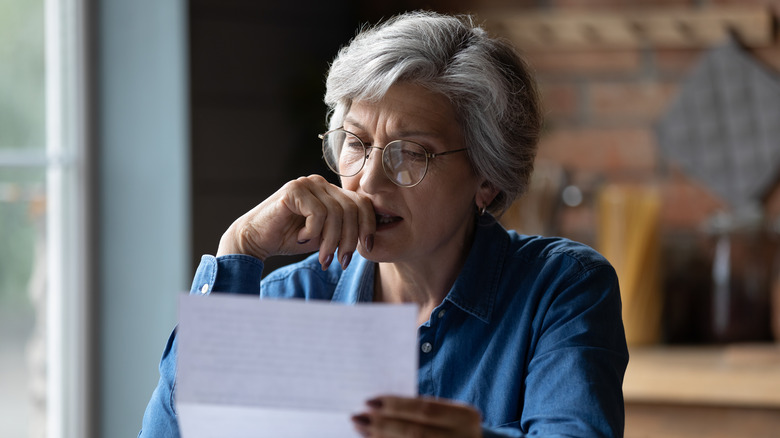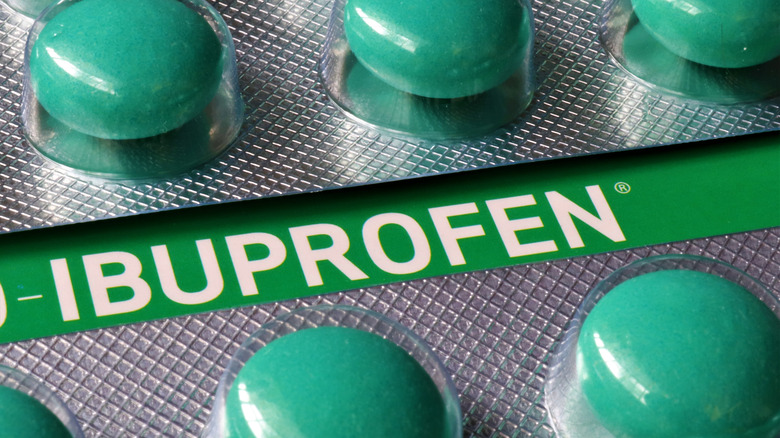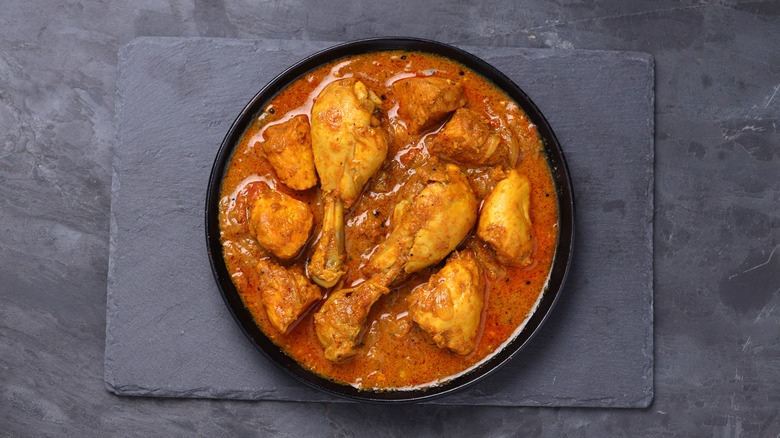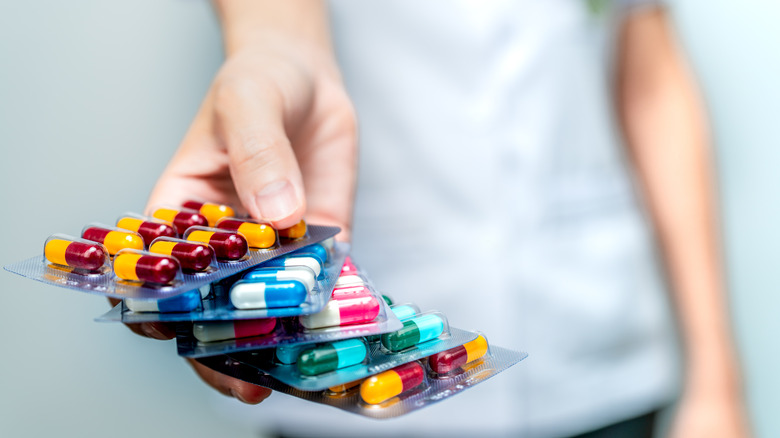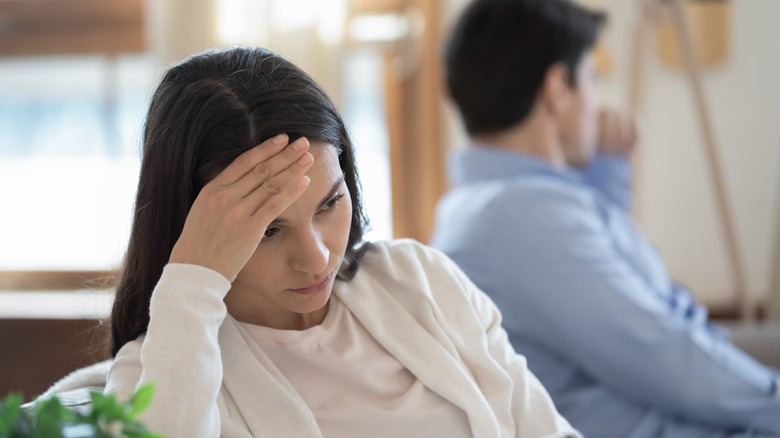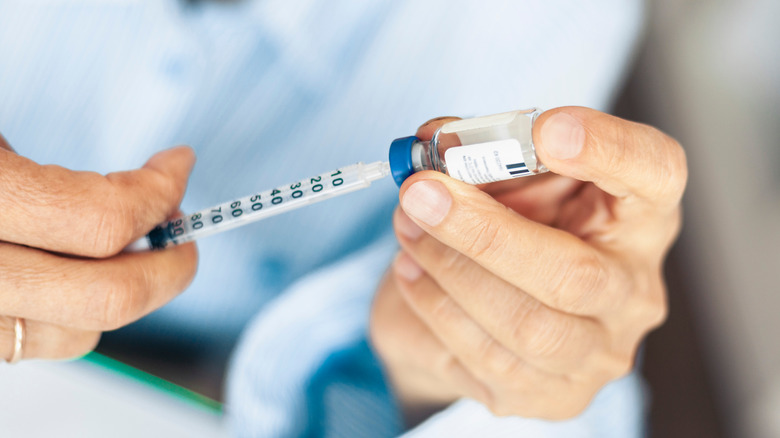You Should Avoid Doing These Things On An Empty Stomach
Let's be real ... being hungry isn't exactly fun. While the frequency with which people eat is hugely individual and based on a number of factors, such as whether someone's fasting or not, or needs to eat more frequently due to a pre-existing condition, as Livestrong states, sooner or later, the hunger gets to us all. We all know the feeling when it does: weakness, tiredness, a grumbling stomach and, for many, the dreaded "hangry" feeling that occurs when your blood sugar decreases and cortisol and adrenaline flood your system, potentially causing a feeling of stress and irritation, according to the Cleveland Clinic.
Yet, despite this, there are times where being hungry is unavoidable. Other times, people intentionally do things on an empty stomach, thinking it's actually more beneficial to do so. From exercising to going to sleep hungry, there are loads of things out there that we think are maybe okay to do on an empty stomach which we actually shouldn't, and we want to put the record straight. Here are the things you should never do on an empty stomach.
Avoid coffee on an empty stomach
The familiar feeling of craving a coffee first thing in the morning is one we know all too well. But, before you have your morning cup of Joe, eat a little food first. In addition to spiking your cortisol levels at the start of the day, "Drinking coffee first thing in the morning can also create gut health issues" if it's hitting your stomach uncushioned by food, explained registered dietitian Carlyn Rosenblum to Pure Wow. As an acidic drink, coffee can help to stimulate stomach acid production and, when drinking it on an empty stomach, it can cause or exacerbate gut issues, like acid reflux.
Instead, it's recommended that you drink your coffee after breakfast, both to stop cortisol levels peaking too severely in the morning and to reduce any gastrointestinal issues. Rosenblum also suggests eating a breakfast that contains foods high in calcium, like spinach, almonds, or yogurt, which can help to neutralize the acidity of the drink (and in your stomach). You can also switch up the type of coffee you drink to make it less acidic, by choosing cold brew instead of hot brewed coffee, which is about 70% less acidic.
Don't go to bed hungry
At some point in your life, you've probably heard that going to bed hungry is the best way to lose weight, or to sleep well, or something else like that. But, the fact of the matter is, going to bed on an empty stomach is pretty much a universal no-no, according to The Healthy. Take sleeping on an empty stomach to lose weight, for example. "A lot of people feel like they're accomplishing something by going to bed hungry," stated spokesperson for the Academy for Nutrition and Dietetics and registered dietitian Wesley Delbridge. However, doing so can drop your blood sugar dramatically, and "The more you feel like you're starving, the more likely you are to binge later on," said Delbridge, particularly in the morning, thereby throwing your metabolism out of whack for the rest of the day and disrupting your diet even further.
Sleeping on an empty stomach also means that your sleep quality can be worse, according to Delbridge, due to hunger pangs to the brain stopping you from falling into a proper deep sleep. What's more, by going to sleep hungry, your body (which is burning fuel 24 hours a day), may end up burning through muscle mass in order to feed itself, meaning you could lose any hard-earned gains you've made in the gym. Instead, it's recommended to eat a small amount a few hours before going to bed.
Avoid food shopping before you eat
Ever been to a grocery store just before dinner? If you have, the likelihood is you've come away with a load of delicious treats you didn't realize you were craving. "You should never go grocery shopping on an empty stomach," said Chains to Gains coach and fitness expert Sterling Graham to Bustle. "This will cause you to buy a lot of sweet/high-carb items that you're most likely craving for at that moment."
This is an oft-repeated refrain, but it turns out it's backed up by scientific study. A two-part study conducted by researchers at Cornell University (via the American Council on Science and Health) looked at food shopping habits at different times of the day, and in participants with different hunger levels. Using participants who hadn't eaten for five hours, the researchers fed some of the individuals crackers and then observed how much they bought at the store. The ones who didn't eat crackers beforehand ended up buying higher-calorie food items. A similar thing occurred when shoppers went to the store just before dinner, instead of just after having eaten their lunch.
Don't work out on an empty stomach
There's so much conflicting information about working out on an empty stomach that it's hard to know where to start, but there's a strong case to say that it may not be the best thing for you — in terms of athletic performance, at least. This is according to a study published in the Journal of Science and Medicine in Sport, which looked at individuals that worked out in a fasted state. It was observed that working out on an empty stomach could inhibit exercise performance and reduce the effectiveness of exercise.
Instead of this, it's important to try and follow proper nutrition when working out, both beforehand and afterward. Try and eat a light meal about an hour before any exercise, or a healthy snack a little beforehand, according to the Mayo Clinic. Try not to eat anything too big or heavy immediately before exercise, and wait at least a few hours before hitting the gym. After exercise, your muscles will be depleted of glycogen, so eating a meal balanced with protein and carbohydrates within two hours of finishing your exercise is a good move to help you recover faster. And, naturally, make sure you're staying hydrated.
Be careful taking a multivitamin without food
Taking a daily multivitamin is a common practice for millions of people worldwide but, as it happens, there's a right way and a wrong way to take them. And, taking a multivitamin on an empty stomach is not the wisest move, due to the impact on your gut. "Taking vitamins on an empty stomach can frequently upset the GI tract," gastroenterologist Christine Lee shared with the Cleveland Clinic. "Many people experience stomach pains, nausea, and even diarrhea."
Lee points out that people who have pre-existing issues, like gastritis, irritable bowel syndrome, or peptic ulcers, can be particularly affected by this. These can be especially aggravated by vitamins containing iron, calcium, or vitamin C, which can cause notably worse symptoms due to their increased likeliness to irritate the lining of the stomach. Instead of putting yourself through this, take your multivitamin with a little something to eat. "Taking them with food enhances the body's ability to absorb the vitamins and decreases your risk of experiencing nausea and upset stomach," stated Lee. And, try not to take them before exercising, either. As Lee said, "It'll just slosh around in your stomach and induce gastric acid production."
Avoid hitting the mall when you're hungry
Have you ever come home from the mall with a load of things you never knew you needed? It could be powerful marketing, or it could simply be that you went with an empty stomach. According to a study published in PNAS (Proceedings of the National Academy of Sciences of the United States of America), hunger levels can even affect buying items that are totally non-food related — and some of the items people ended up buying were pretty weird.
After completing a cognitive test, the researchers leading the study sent participants to a department store that stocked both food and non-food items. Some of the participants had higher hunger levels than the others. It was found that, upon leaving the store, participants who had higher hunger levels had made more purchases, both of food and non-food items. What was interesting, though, was that the nonfood items purchased (like, weirdly, binder clips) had no relation to food at all. This suggests that hunger can influence buying patterns beyond simply choosing things that we think will sate our hunger.
Don't make financial decisions if you haven't eaten
We all know that feeling of anticipation and nervousness before laying down a big sum of cash. If you're doing it while you're hungry, that anticipation might turn into regret quite quickly, as making financial decisions on an empty stomach can be risky business. This is all due to the hunger hormone ghrelin, which is produced by the stomach and works to increase our appetites and release growth hormones. While ghrelin primarily works to alert us to eat, a 2021 study, presented via the Endocrine Society, found that it could affect other areas of behavior.
The study looked at decisions around cash in participants with different levels of ghrelin and found that people who had higher levels of the hormone (and therefore, higher hunger) tended to make decisions that had a more immediate, smaller reward. Participants who had lower levels of ghrelin, however, tended towards making longer-term, ultimately more-lucrative decisions. As Franziska Plessow, study author and assistant professor of medicine at Massachusetts General Hospital and Harvard Medical School, Boston, noted, "Our results indicate that ghrelin might play a broader role than previously acknowledged in human reward-related behavior and decision making, such as monetary choices."
Avoid gum chewing on an empty stomach
This one might be pretty surprising, but go with it. While chewing gum is a favorite pastime between meals to keep us from snacking or simply freshen the breath, chewing it on an empty stomach can cause some surprising issues. A study published in the American Journal of Gastroenterology looked at the effects of chewing gum on the gut and found that chewing gum was as effective at producing stomach acid as eating food was.
This may not be a problem if you have a full stomach but, if you're stomach is empty, it means that your stomach acid is increasing with no food to interact with. This can cause a range of uncomfortable issues, like bloating, heartburn, nausea, and abdominal discomfort, according to Healthline. While this is unpleasant enough, having high levels of stomach acid can also contribute to or increase the risk of other conditions, like peptic ulcers, gastrointestinal bleeding, and GERD. So if you're about to chomp on a stick of gum, make sure you've eaten a little something beforehand.
Don't take pain meds like ibuprofen or aspirin without food
Taking medication on an empty stomach is always a bit of a case-by-case situation. Some medications are more effective without food, whereas some definitely should be taken with a meal. In the case of certain pain medications, like ibuprofen, it's wisest to have them with a meal due to the potentially harmful side effects. "Taking ibuprofen on an empty stomach may cause irritation of the stomach lining and bleeding ulcers," said cardiologist Adam Splaver, who practices at South Florida-based Nanohealth Associates, to Pop Sugar.
In fact, this is true of several other pain medications, too. "This holds true for all other NSAIDs as well as aspirin, which may reduce the stomach lining's ability to protect itself from the harsh acid produced to aid in the digestive process," added Splaver. NSAIDs, or non-steroidal anti-inflammatory drugs, can be riskier to take if you have a history of stomach issues, stomach ulcers, or bleeding problems, stated the Cleveland Clinic. If this is the case, check with your doctor before taking any medication in the NSAID family.
Avoid a lot of alcohol when your stomach is empty
Ah, yes. Drinking on an empty stomach. This is a sure-fire way to get a little more buzzed than you mean to — and, in certain cases, drinking alcohol on an empty stomach can be highly dangerous. "The short-term effects of drinking on an empty stomach, particularly stronger alcoholic drinks, can mean a more rapid rise in blood alcohol," specialist in alcohol and mental health and NHS consultant, Tony Rao, noted to HuffPost UK. Without food to help absorb the alcohol, it goes into the bloodstream in a higher quantity quickly, meaning you're left with a sore head in the morning.
Drinking large quantities of alcohol without eating beforehand, however, is not advised. "Binge-drinking on an empty stomach is dangerous, as the rapid rise in blood alcohol can increase the toxic effects of alcohol on the brain," said Rao. To add to that, drinking alcohol irritates the stomach lining when it reaches contact with stomach acid and, if you're drinking on an empty stomach, it can worsen the effects of this. Most worryingly, drinking alcohol on a consistently empty stomach can result in a condition called alcoholic ketoacidosis, which can be fatal.
Avoid food that's particularly spicy
It's well-known that eating spicy food can cause a few tummy troubles, but eating it on an empty stomach can be a recipe for disaster. According to NYU Langone Medical Center gastroenterologist Lisa Ganjhu, who spoke to HuffPost, when you eat heavily spiced food with nothing else, "There's nothing else in there to mix with the spices and take the edge off when they come into contact with your stomach lining." When this happens, the spices can irritate the lining of your stomach, causing a little gastric upset.
So that's why, according to Ganjhu, a lot of Indian food comes with a yogurt element on the side. Dairy is very adept at coating the lining of the stomach, protecting it from the harsh spices and their effects. Having a little yogurt or milk before an especially spicy meal can be a great way to reduce any gastrointestinal upset. It's also important to point out that not all spices are going to irritate your stomach hugely. While jalapeños, cayenne, and other chili peppers can cause stomach upsets, milder, more fragrant spices, like cumin and coriander, will irritate your digestive system far less.
You'll want to be careful when taking certain antibiotics
If you get a prescription of antibiotics from your doctor, it's important to follow the instructions on how to take them to the letter. The last thing you want is another trip to the doctor. That's why it's useful to be particularly attentive when taking antibiotics, as some of them are not to be taken on an empty stomach. Amoxicillin, for example (which is used to treat certain types of bacterial infection) and doxycycline (used to treat some types of sexually transmitted diseases, among various other bacterial infections), should both be taken with food, according to Healthline. This can reduce stomach upsets or other gastric side effects.
Having said this, some antibiotics should be taken on an empty stomach to increase their effectiveness. Tetracycline, commonly used in conjunction with respiratory infections, should always be taken on an empty stomach, due to its interactions with certain foods (notably those containing iron), which can prevent its proper entry into the bloodstream (per Drugs.com). Each antibiotic will be different, though, and the main thing to remember is to check with your doctor about how best to take your medication.
Try not to argue when you're hungry
If you've ever felt the bone-shaking indignation of being stuck in an argument and suddenly feeling your stomach rumble could be a useful moment of reflection. Arguing with someone on an empty stomach is definitely not the wisest move. When you're hungry, you're liable to make erratic choices and potentially say things you might regret. "Self-control takes a lot of fuel," said Brad J. Bushman, PhD, an anger researcher, to The Good Life, as reported by The Healthy. "Our brain is fueled by calories, including the prefrontal cortex that controls reasoning and emotional control." As Bushman added, "The brain uses about 25% of calories we take in," and, if the brain isn't being fueled adequately, you might find yourself having to apologize later on.
The link between hunger, poor emotional control, and feelings of anger was observed in a pretty wild psychological study conducted by Ohio State University. In it, married couples were asked to take their blood sugar levels, and then ... wait for it ... take a doll representing their partner, and stick in pins. The people with the lowest blood sugar ended up sticking double the amount of pins in as the people with the highest.
Avoid taking certain type 2 diabetes medications on an empty stomach
People with type 2 diabetes know the importance of maintaining correct blood sugar, and medication is sometimes needed to help control this. It's important that you follow the instructions of certain medications correctly, however, as taking them on an empty stomach can sometimes cause unwanted side effects.
This is the case with metformin, a medication that is commonly used to treat high blood sugar levels and to increase the effectiveness of insulin on your body, according to Medical News Today. Taking metformin in a fasted state, however, can cause adverse gastrointestinal effects and stomach irritation, as shown by a study published in The Journal of Clinical Pharmacology. For this reason, it's recommended that metformin is taken with food to minimize the side effects in your stomach, and to be aware of any instructions your doctor gives you for medication. If you're reading this and thinking, "Yeah, sure, of course I'll take my medication correctly, duh!" then you're on the right track. A whopping 50% of people, in fact, don't follow their doctor's instructions, according to the CDC.


